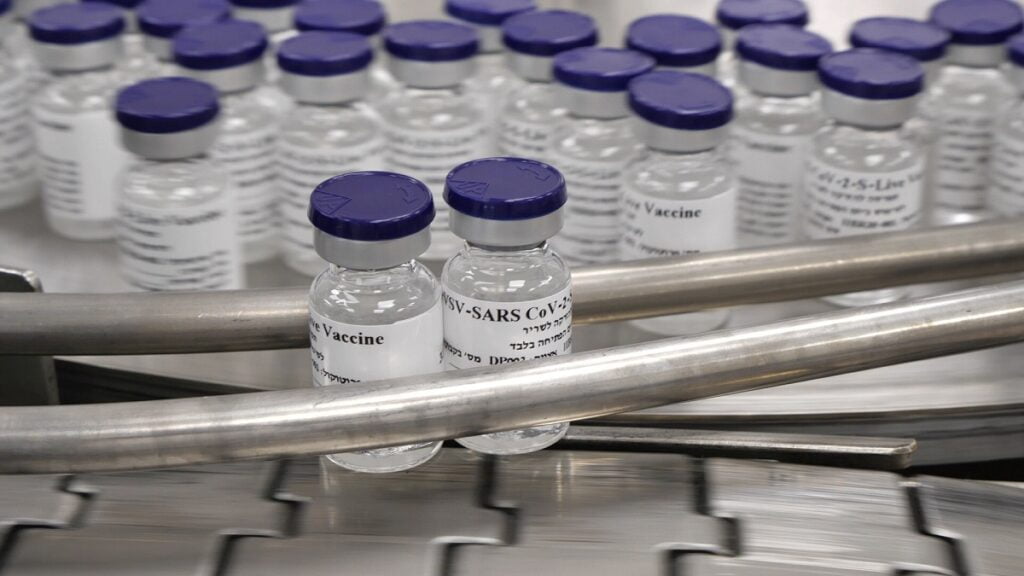The second phase of the clinical trial for the Israeli vaccine candidate against COVID-19 developed by the government-run Israel Institute for Biological Research (IIBR) has been approved and is expected to begin in the next few days, the Defense Ministry announced on Monday.
The first phase, which began November 1 with 80 volunteers, was completed successfully with no significant side effects identified and two expert committees recommended the approval of the second phase, the ministry said.
Approximately 1,000 volunteers aged 18 and over will take part in the second phase which will take place at Sheba and Hadassah Medical Centers and will gradually expand to additional hospitals throughout the country.
For the second stage, scientists aim to complete vaccine safety precautions, determine the effective dosage, and further determine the Israeli vaccine’s effectiveness, the ministry said. A third phase with up to 30,000 volunteers in Israel and/or abroad is expected to begin in April/May should the second stage prove successful.
The IIBR said in November that it produced more than 25,000 vaccine doses for the first and second phases and can undertake large-scale production of vaccines – approximately 15 million doses.
In summer, the Ness Ziona-based institute’s scientists said that their vaccine candidate used vesicular stomatitis virus (VSV), an animal virus that does not cause disease in humans, and in which the spike protein was replaced with that of SARS-CoV-2. VSV is also the basis for a separate, effective vaccine against the Ebola virus.
The vaccine, which the scientists called a recombinant VSV-ΔG-spike or rVSV-ΔG-spike, had been tested on a number of animal models, including golden Syrian hamsters, mice, rabbits, and pigs, and was shown to be safe and well-tolerated, and able to bind and neutralize SARS-CoV-2 efficiently.
The BriLife vaccine is unlike the mRNA vaccines developed by Pfizer/BioNtech and Moderna. Such vaccines teach our cells how to make a protein that triggers an immune response, rather than introducing a weakened or inactivated virus which has been the traditional vaccine approach.
Sign up for our free weekly newsletter
SubscribeThe Israeli vaccine’s commercial name is Brilife, a combination of “Bri” which alludes to the Hebrew word for health, “briut,” “il,” for Israel, and “life.”
While local vaccine development is ongoing, Israel received thousands of the newly approved Pfizer and BioNtech vaccine, which was cleared for emergency use over the weekend by the US Food and Drug Administration (FDA). The shipment of the companies’ vaccine candidate, BNT162b2, an mRNA vaccine, for persons aged 16 and over, arrived in Israel last week via special charter flights with a mass vaccination drive expected to begin next week.
Millions of doses of the Pfizer/BioNtech vaccine are set to be delivered by the end month.
Israel also has a number of agreements with governments and companies working on separate COVID-19 vaccines including Moderna, a Massachusetts-based firm that was the first to develop an experimental mRNA vaccine, mRNA-1273, that went into trial quickly.
Israel has secured six million doses of the Moderna vaccine.
NOTE: This article was updated on July 13, 2021 to correct the mistaken assertion that BriLife is an mRNA vaccine. It is a live-virus vaccine based on an existing virus (VSV) that is not harmful to humans.
Related posts

Israeli AI Safety Tool Among TIME’S Best Inventions For 2024

TAU Team Discovers Mechanism To Eliminate Cancerous Tumors

Ashdod Port Investing In Startups As Part Of Innovation Strategy




Facebook comments